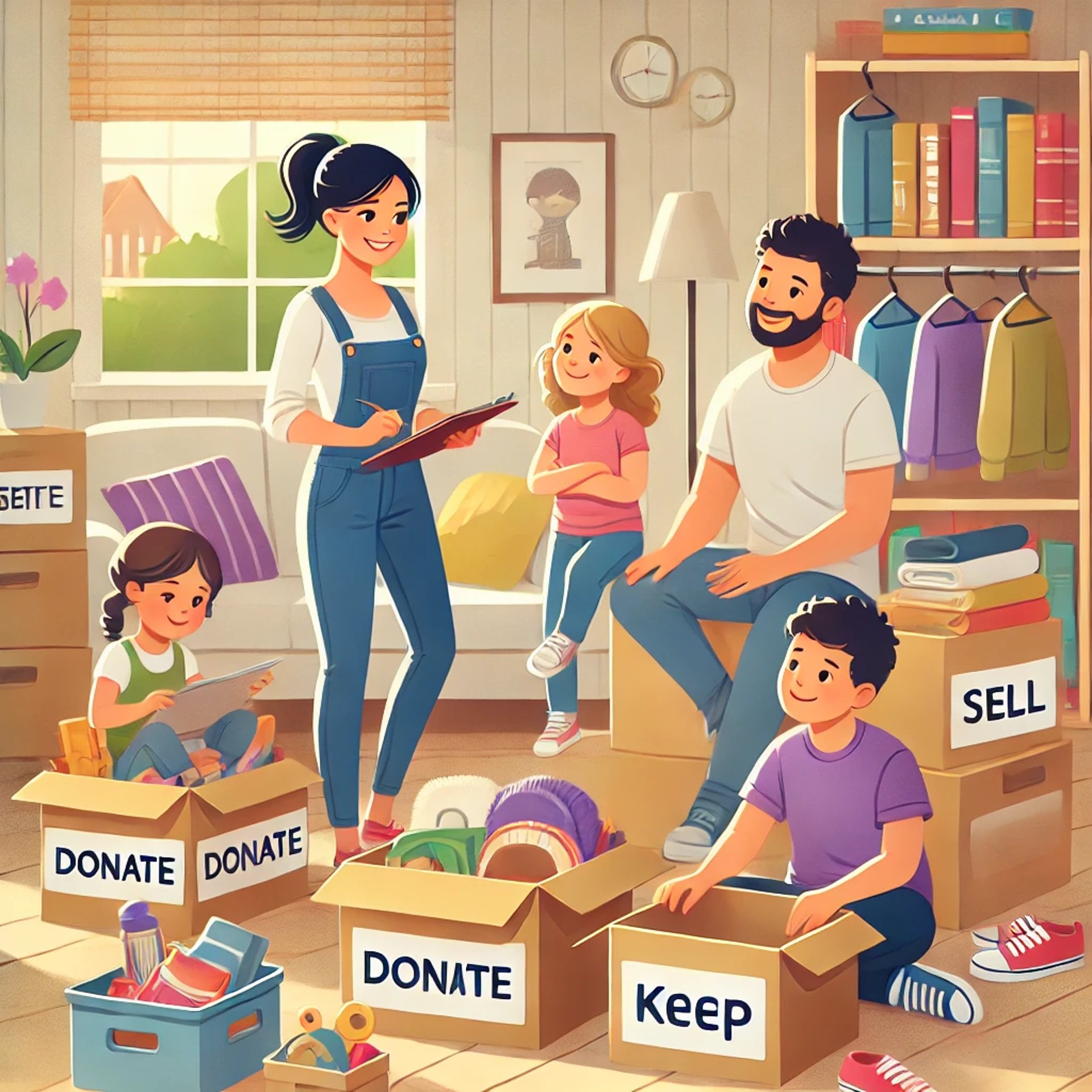Leovan Removals Moving Checklist
Essential tasks for a smooth relocation process when moving to a new home.


Organize Packing Supplies
Gather boxes, tape, and packing materials for efficient packing during your move.
Notify Utilities Services
Ensure all utilities are transferred or set up at your new home before moving.
Update Address Information
Change your address with postal services, banks, and other important institutions.
Contact Your Movers
Contact Leovan team today to find out how we can help you on your next move. Go to Contact Form.

Essential Moving Tasks
Your ultimate checklist for a smooth relocation, ensuring no essential task is overlooked.
This checklist made my move so much easier! I completed every task without missing a beat.
Sarah J.


★★★★★

Contact Us for Assistance
Reach out for help with your moving home checklist and essential tasks. We're here to support your relocation journey every step of the way.
Support
07447770770
Help
info@leovan.com
Moving Checklist
Essential tasks for a smooth relocation process when moving homes. Stay organized and ensure nothing is overlooked during your move.
Location
Leovan Removals
12 Morland road
Aldershot GU113SB
Hours
Available 24/7
Moving Made Easy
Your essential checklist for setting up utilities and more when relocating in England.
Essential Moving Home Checklist for England
Moving home can be exciting—but also daunting. To help you stay organised and stress-free, here’s a practical, step-by-step moving checklist drawn from leading UK removal experts.
1. Pre-Move Preparation
Create a Moving Folder: Keep all your quotes, receipts, contracts, and correspondence in one safe place (physical or digital).
Book Your Removal Company Early: Secure your preferred date with a reputable mover at least 4–6 weeks in advance, especially during busy seasons.
Declutter: Go room by room and decide what to keep, donate, sell, or recycle. The less you move, the easier (and cheaper) the process.
Arrange Insurance: Check your home contents insurance and ensure it covers your move, or ask your removal company about their coverage.
Order Packing Materials: Stock up on sturdy boxes, bubble wrap, tape, packing paper, and labels. Many removal companies offer professional packing materials or services.
Make a Packing Plan: Tackle non-essential rooms first and label boxes with their contents and destination room.
2. Notify and Arrange Key Services
Utilities (Gas, Electricity, Water):
Contact current suppliers to give final meter readings and your moving date.
Set up new accounts at your new address—consider using comparison sites like u-Switch for better deals.
Take initial meter readings at your new home as soon as you arrive.
Broadband & Landline:
Arrange transfer or installation of broadband and phone lines well in advance, as appointments can take weeks.
Research providers if your current one doesn’t cover your new area.
Council Tax & TV Licence:
Inform both your old and new councils about your move.
Update or transfer your TV Licence via TV Licensing.
Water Supplier:
Contact the relevant water company (e.g., Thames Water, Severn Trent) for both your old and new address.
3. Change of Address Notifications
Government Agencies:
Update DVLA for your driving licence and vehicle logbook.
Notify HMRC and DWP for tax and benefits.
Register with your new GP and dentist via NHS.
Financial Institutions:
Inform your bank, building society, insurers, credit card providers, and pension schemes.
Personal and Professional Contacts:
Update your employer, schools, subscriptions, gym, online services, and loyalty programmes.
Mail Redirection:
Set up Royal Mail Redirection for peace of mind while you update everyone else.
4. Packing & Preparing Your Home
Pack Room by Room: Start early and pack non-essentials first. Use wardrobe boxes for clothes and clearly mark fragile items.
Essentials Box: Prepare a box with daily essentials—kettle, mugs, snacks, toiletries, phone chargers, bedding, and important documents.
Dismantle Furniture: Take apart large items if needed, and keep screws and bolts in labelled bags.
Defrost the Freezer: Do this 24 hours before moving.
Child & Pet Care: Arrange for children and pets to be looked after on moving day for safety and less stress.
5. Moving Day Checklist
Final Checks at Your Old Home:
Record final meter readings (and take photos for your records).
Check every room, cupboard, and loft.
Hand over all keys to the new owner, estate agent, or landlord.
On Arrival at Your New Home:
Take initial meter readings (and photos).
Check utilities (electricity, gas, water, heating, broadband) are working.
Direct the movers to the correct rooms and check for any damages as you unload.
Keep your essentials box handy!
6. Settling Into Your New Home
Start Unpacking Strategically: Focus on the kitchen and bedrooms first.
Check Safety Alarms: Test smoke and carbon monoxide alarms.
Introduce Yourself: Greet your new neighbours—a friendly face can make settling in easier.
Register to Vote: Update your details on the electoral roll.
Register with a Local GP and Dentist: If you haven’t already.
Check Initial Utility Bills: Ensure meter readings match your records.
7. Key Utility Providers in England
Electricity & Gas: British Gas, EDF Energy, Octopus Energy, E.ON Next, Scottish Power.
Water: Thames Water, Severn Trent, Anglian Water, Yorkshire Water.
Broadband & Phone: BT, Virgin Media, Sky, TalkTalk.
Bonus Tips:
Stay Flexible: Unexpected hiccups happen—keep your moving day essentials close, and don’t hesitate to ask your removal company for advice.
Keep Calm: Take a deep breath and enjoy your fresh start!
Personalised Tips for a Smooth Move
Start Early, Start Small: Begin your preparations at least a month before moving day. Tackle one drawer or cupboard at a time—small achievements will keep you motivated and avoid last-minute panic.
Make a ‘First Night’ Survival Kit: Pack a box or bag with everything you’ll need your first night—pyjamas, toiletries, medication, chargers, snacks, a towel, and bedding. This makes your first evening comfortable, no matter how late you finish.
Label Everything Clearly: Beyond “kitchen” or “bedroom,” jot down key contents (“plates and mugs” or “bedding and towels”) so you can find things easily when you unpack.
Photograph Important Setups: Take photos of the back of your TV, computer, or any tricky furniture assembly before you take them apart. Reconnecting cables and reassembling furniture will be much easier.
Keep Valuables and Important Documents With You: Passports, jewellery, contracts, and other essentials should travel with you rather than in the moving van.
Communicate With Your Movers: Share access details (parking, stairs, security codes) and any fragile or high-value items. A well-briefed team can work more efficiently and safely.
Prepare for All Weathers: In England, you never know! Keep raincoats and towels handy for wet days, and water bottles for hot ones.
Don’t Pack Cleaning Supplies Until the End: You’ll likely want to do a final sweep of your old place and a quick clean at your new home before unpacking.
Plan Meals Ahead: Empty your fridge and freezer in the days leading up to your move, and have easy-to-prep meals or takeout options ready for moving day.
Say Farewell to Your Old Neighbours: Leaving a contact card or saying goodbye can ensure you get redirected post, and it leaves a positive final impression.
Check Pet and Child Safety: If possible, arrange for childcare or pet-sitting on moving day. If your kids are involved, let them pack a special “moving day bag” with toys, snacks, and comfort items.
Take Time to Celebrate: Once you’re in, order your favourite takeaway, pop the kettle on, and take a moment to enjoy your new home before the real unpacking begins.
These personal touches can make your move not just efficient, but also less stressful and more enjoyable. If you’d like advice tailored to your specific situation (family, pets, long-distance, etc.), just let me know!
Get in touch
© 2024. All rights reserved.


Hours:
Open 24 hours



